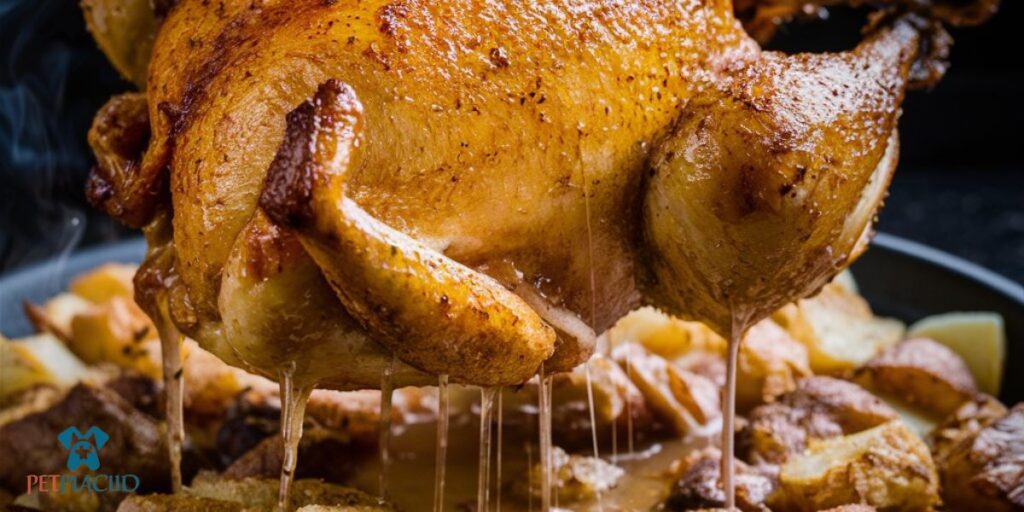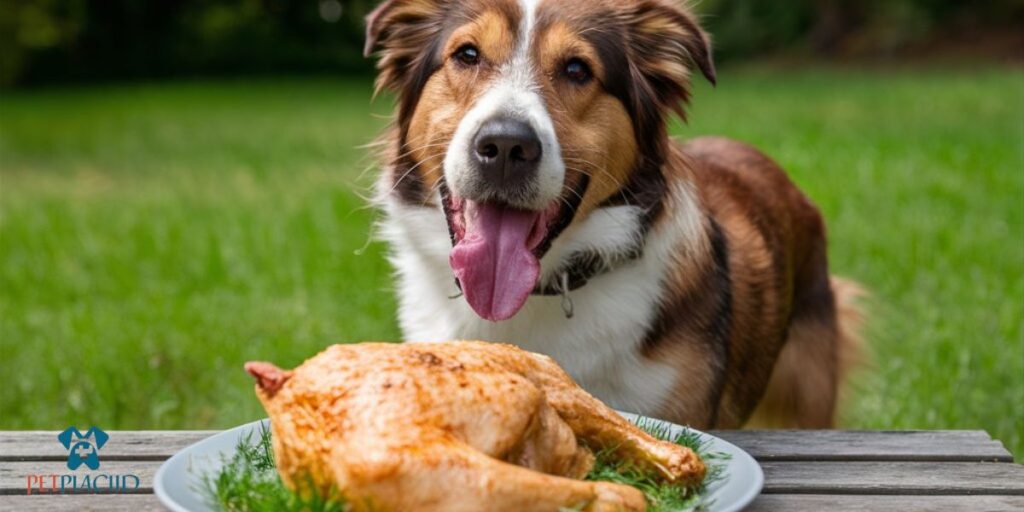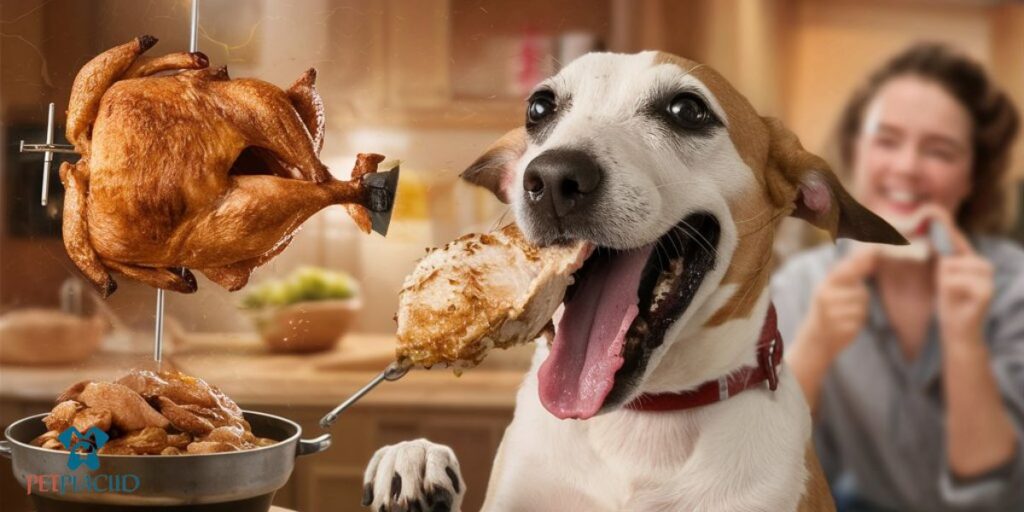Dogs Eat Rotisserie Chicken queries the safety of this seasoned, slow-cooked chicken for canine consumption, addressing concerns of pet owners seeking to provide flavorful treats without compromising their pet’s health. This question arises from a desire to balance dietary variety with canine wellness, prompting scrutiny of the nutritional content and potential risks associated with feeding rotisserie chicken to dogs.
The Curious about feeding rotisserie chicken to your furry friend the Delve into this captivating question, balancing taste with nutrition. Explore potential health impacts and portion control, ensuring your pet’s well-being with informed decisions.
Can Dogs Eat Rotisserie Chicken This question arises from concerns about the safety and nutritional benefits of giving this tasty meal to pets. While rotisserie chicken may appeal to dogs, worries about bones, seasoning, and high-fat content require careful and limited feeding. Although small amounts of boneless chicken could be occasional treats, pet owners should seek advice from a veterinarian to ensure their dog’s well-being.
What Is Rotisserie Chicken and Its Nutritional Content?
Rotisserie chicken is a popular dish made by slow-roasting seasoned chicken on a rotating spit. It’s often seasoned with a variety of spices, making it flavorful and aromatic. However, it’s essential to understand its nutritional content before feeding it to your furry friend.
Rotisserie chicken typically contains a significant amount of protein, which is essential for your dog’s muscle growth and overall health. However, it’s also crucial to be aware of potential drawbacks, such as high salt and fat content, as well as the presence of cooked bones.
Is Rotisserie Chicken Safe for Dogs?
While dogs can consume rotisserie chicken in moderation, there are certain considerations to keep in mind to ensure their safety and well-being. Concerns primarily revolve around potential hazards such as bones, seasoning, and high-fat content. It’s essential to remove bones before feeding, as they can splinter and pose a choking hazard.
Additionally, excess seasoning and fatty portions should be avoided, as they can lead to gastrointestinal upset and other health issues. Moderation is key when offering rotisserie chicken to dogs, and consulting with a veterinarian for personalized feeding recommendations is always advisable.Concerns
Rotisserie chicken often contains a high salt content

Which can pose risks to dogs’ health. Excessive salt intake may result in conditions such as sodium ion poisoning. Therefore, it’s crucial to remove any excess seasoning from the chicken before offering it to your dog. Additionally, it’s advisable to limit their consumption of salty foods to prevent adverse health effects.
Risks Associated with High Fat Content
Rotisserie chicken skin and fatty portions can lead to gastrointestinal upset and pancreatitis in dogs if consumed in large quantities. Moderation is key to preventing such health issues.
Recommended This Blog: F2B MINI GOLDENDOODLE
Potential Dangers of Cooked Bones
Cooked bones, including those found in rotisserie chicken, can splinter and pose a choking hazard or cause internal injuries to dogs. Always remove bones before offering chicken to your furry friend.
Can Dogs Consume Rotisserie Chicken Skin?
While some dogs may enjoy the taste of rotisserie chicken skin, it’s best to remove it before feeding. The skin is high in fat and can contribute to obesity and digestive problems in dogs. Opt for leaner portions of chicken meat instead.
Steps to Take If Your Dog Consumes Rotisserie Chicken
Rotisserie chicken, while tempting for dogs, can pose risks if consumed inappropriately. If your dog happens to ingest rotisserie chicken, prompt action is necessary to ensure their well-being.

Monitor for Symptoms: Keep a close eye on your dog for any signs of discomfort or illness. Symptoms may include vomiting, diarrhea, lethargy, or signs of abdominal pain such as whining or restlessness.
Contact Your Veterinarian: If you notice any concerning symptoms or suspect that your dog has consumed a significant amount of rotisserie chicken, it’s crucial to contact your veterinarian immediately. They can provide guidance based on your dog’s health status and advise on the necessary steps to take.
Provide Supportive Care: Follow any instructions given by your veterinarian, which may include providing supportive care at home or bringing your dog in for a thorough examination. Be prepared to provide details about the amount of chicken ingested and any accompanying symptoms.
Prevent Further Ingestion: Take precautions to prevent your dog from accessing any remaining rotisserie chicken or other potentially harmful foods. Store leftovers securely and be vigilant about keeping human foods out of reach of your pet.
Proper Portion Sizes
When feeding rotisserie chicken to your dog, ensure you offer it in small, bite-sized pieces and limit the amount to prevent overeating and digestive issues. A general guideline is to incorporate chicken into their diet as an occasional treat rather than a regular meal.
Frequency of Offering Rotisserie Chicken
While dogs can enjoy rotisserie chicken as an occasional treat, it should not replace their regular diet. Limit their intake to prevent nutritional imbalances and obesity. Consult with your veterinarian for personalized feeding recommendations based on your dog’s age, size, and health status.
Considering Other Human Foods for Dogs
In addition to rotisserie chicken, there are several other human foods that you may wonder about offering to your dog.
Exploring Pickles, Cheerios, Corn on the Cob, and Black Beans
While pickles and Cheerios are generally safe for dogs in small quantities, it’s essential to avoid feeding them corn on the cob and black beans. Corn cobs can pose a choking hazard and cause intestinal blockages, while black beans may lead to digestive upset due to their high fiber content.
Frequently Asked Questions
Can dogs eat cooked chicken bones?
It’s not safe. Cooked chicken bones can splinter and cause internal injuries to dogs.
Is it okay for dogs to eat chicken skin?
Not recommended. Chicken skin is high in fat and can lead to digestive issues and obesity in dogs.
How much rotisserie chicken is safe for dogs to eat?
Offer in moderation. Small, bite-sized pieces as an occasional treat are suitable for dogs.
What should I do if my dog ate too much rotisserie chicken?
Monitor for symptoms. Contact your veterinarian if your dog shows signs of discomfort, such as vomiting or diarrhea.
Conclusion
While dogs can enjoy small portions of rotisserie chicken as an occasional treat, pet owners must exercise caution due to potential risks associated with bones, seasoning, and high-fat content. It’s imperative to prioritize the safety and well-being of your furry friend by consulting with a veterinarian before introducing any new foods into their diet, including rotisserie chicken.
By following proper feeding guidelines, monitoring for any adverse reactions, and seeking professional advice when needed, pet owners can ensure that their canine companions can enjoy tasty treats safely and responsibly.

Jackson is a seasoned professional in the field of pets, boasting four years of enriching experience. His expertise spans pet care, training, and health, ensuring insightful and reliable content for pet enthusiasts on our site.







